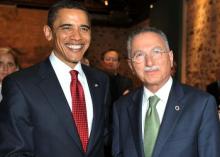
Organization of Islamic Cooperation secretary-general Ekmeleddin Ihsanoglu meets with President Obama at the White House in April 2011. (Photo: OIC)
(CNSNews.com) – With key Muslim countries on the rise and the Muslim population on track to exceed a quarter of the planet’s projected total population by 2030, the Islamic world deserves a permanent seat on the U.N. Security Council, says Organization of Islamic Cooperation (OIC) Secretary-General Ekmeleddin Ihsanoglu.
In a speech this week, he laid out his vision for the future of the bloc of Islamic states as his eight-year term at the helm draws to an end.
Speaking at the Russian Foreign Ministry’s international relations institute, Ihsanoglu said the 57-member OIC already comprised the biggest voting bloc at the United Nations and it was time it acquired “a new position.”
“During the first reconsideration of the reform in the U.N., I think there should be a seat for OIC in the Security Council,” he said. “If you look to the structure of the Security Council of today, you have the P5 [permanent five] and there are representatives of different civilizations, different cultures, political powers.”
“But you won’t find representative of more than 1.6 billion people of Muslim world.”
The U.N.’s top decision-making body currently has five permanent, veto-wielding members – the U.S., Britain, France, China and Russia – and 10 non-permanent members serving for two-year periods each.
A campaign to reform the council by expanding its permanent membership has been struggling to gain traction for decades, plagued by regional jealousies, competing interests and an unwillingness among the existing permanent members to extend veto power to any newcomers.
Even so, the countries most often viewed as contenders for any new permanent seats – India, Japan, Brazil, Germany and South Africa – exclude Muslim nations.
No one Islamic country has emerged as an obvious addition to that group, although Australia a decade ago backed a permanent seat for Indonesia, the world’s fourth most populous nation. The idea of Egypt getting a permanent seat circulated several years ago but instability there since 2011 will not have won it much support beyond the region. The same would likely apply to Pakistan.
Other larger Islamic countries either have a muted international profile (Bangladesh) or are too controversial (Iran). Smaller countries with an outsized profile (Qatar) have rivals within the bloc. And Turkey’s performance as a non-permanent member in 2009-10 set off warning bells in the West when it opposed an Iran sanctions resolution that was so watered-down even Russia and China supported it.
Ihsanoglu’s proposal for a permanent seat for the OIC would allow countries within the bloc to rotate, rather than have a single one hold the position in perpetuity.
OIC should have same status at UN as European Union
In his speech in Moscow, he also recalled that the European Union since 2011 has enjoyed an elevated status at the U.N.
(The U.N. General Assembly that year voted to give the 27-member E.U. the right to speak at the assembly, introduce proposals, circulate documents etc., rights already enjoyed by individual E.U. member states.)
Although he conceded that the E.U. has a different structure to that of the OIC, Ihsanoglu said, “I think the status acquired by the E.U. in 2011 in U.N. should also be acquired by the OIC.”
While the E.U. is working on developing a “common foreign and security policy” and has mechanisms for handling differences when they do arise, OIC member-states are deeply split over numerous issues.
The Syrian civil war and the political turmoil in Egypt are only the latest crises to divide a bloc stretching from Latin America to South-East Asia and encompassing rivalries including those between Sunnis and Shi’ites and Arabs and Persians.
Reflecting these divisions, Ihsanoglu was himself recently targeted for harsh criticism when members of the Turkish government accused him of not speaking out on the OIC’s behalf to condemn the ousting of Egyptian President Mohammed Morsi, a Turkish ally, and the military’s crackdown on the Muslim Brotherhood.
Ihsanoglu is himself a Turk, but the OIC secretariat is based in Saudi Arabia and has close ties to the Saudi monarchy. The Saudi rulers were pleased to see Morsi go, and some Turkish critics suspected that Ihsanoglu’s silence on the matter suggested he had become overly cozy with his hosts.
One of them, Turkish Deputy Prime Minister Bekir Bozdag, suggested that Ihsanoglu resign, saying that the OIC was meant to defend the interests of Islam, not those of “monarchs.”
A ‘promising’ Islamic future
Ihsanoglu became secretary-general of the OIC in January 2005 and is due to retire at the end of this year. Under his leadership the bloc has become a far more activist organization, wielding its clout at the U.N. and its Human Rights Council and confronting the West over “Islamophobia” and the “defamation” of religion.
He told his Moscow audience that the future of the Islamic world was “promising,” not only politically but also from economic and demographic points of view.
He cited the “next 11” – a group of countries identified by Goldman Sachs as potential future growth markets after the BRICS (Brazil, Russia, India, China and South Africa) – and noted that seven of the 11 are Islamic states: Bangladesh, Egypt, Indonesia, Iran, Nigeria, Pakistan and Turkey. (The others are Mexico, the Philippines, South Korea and Vietnam.)
Ihsanoglu pointed to a Pew Research Center report on the future of the global Muslim population, which forecasts that the Muslim population will grow at twice the rate of non-Muslims over the next two decades – 1.5 percent per year compared to 0.7 percent per year.
At that rate, Pew estimates that the number of Muslims will reach 2.2 billion by 2030 – 26.4 percent of the projected global population, up from 23.4 percent in 2010.
Source material can be found at this site.









